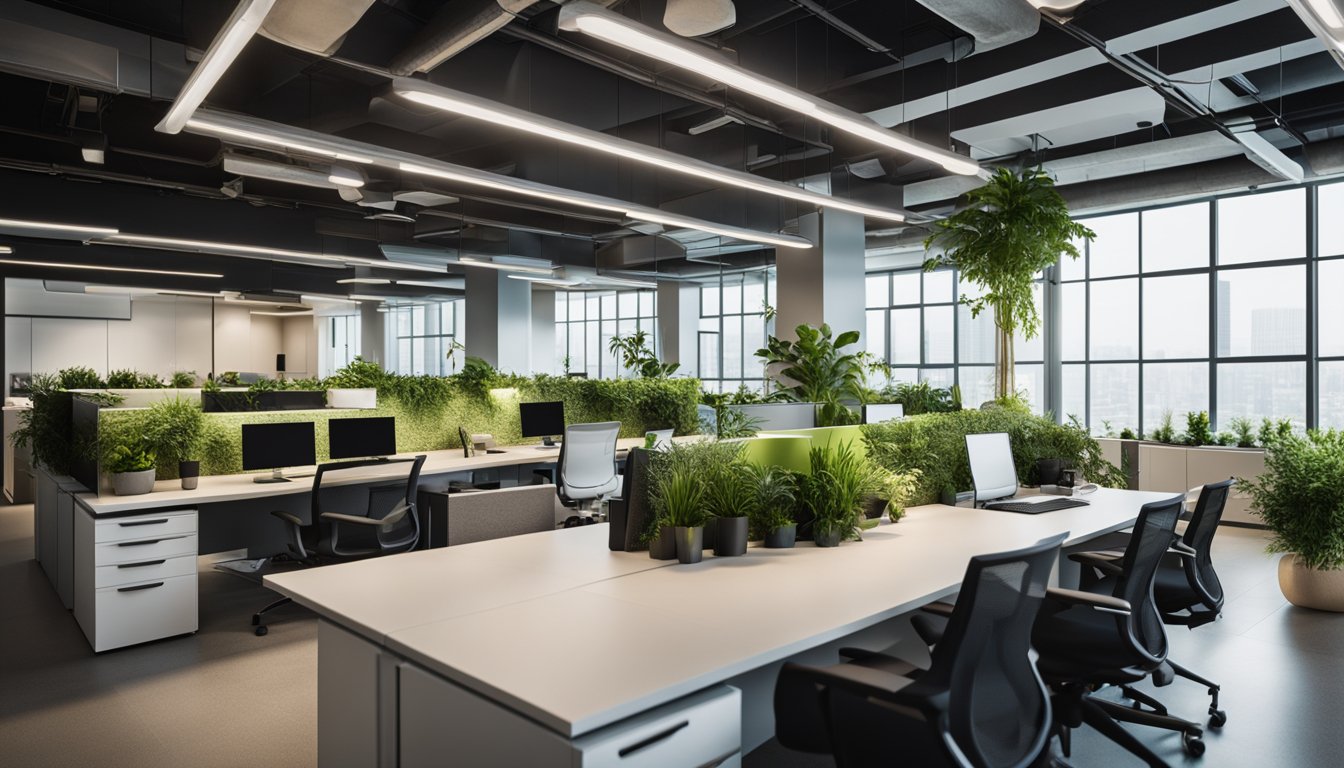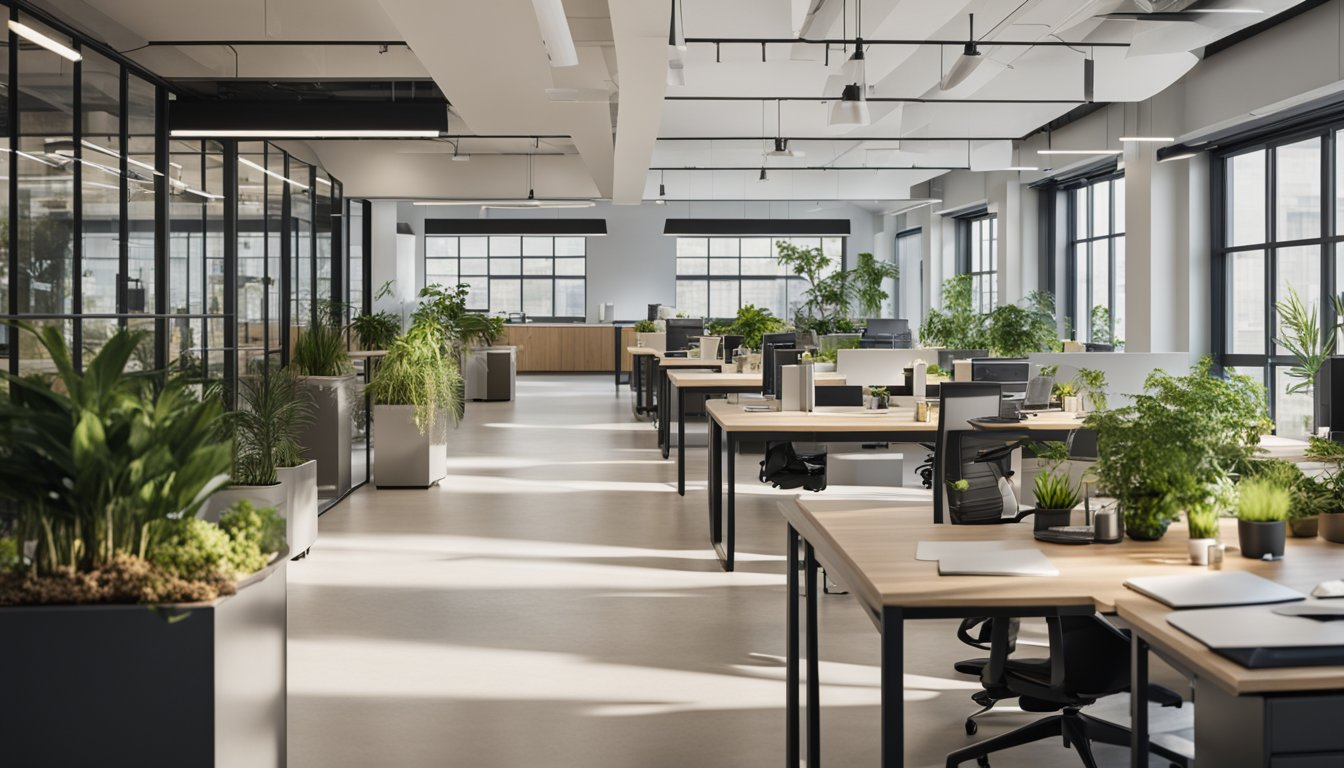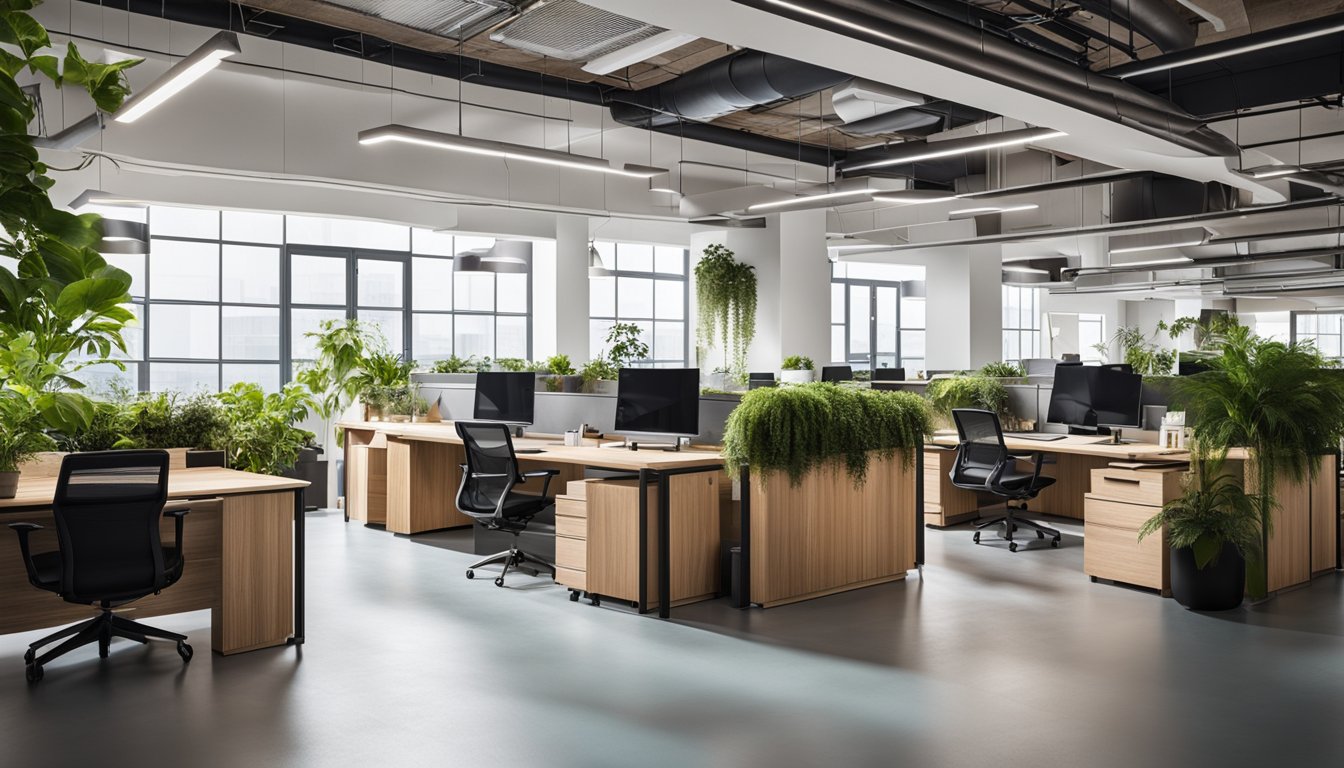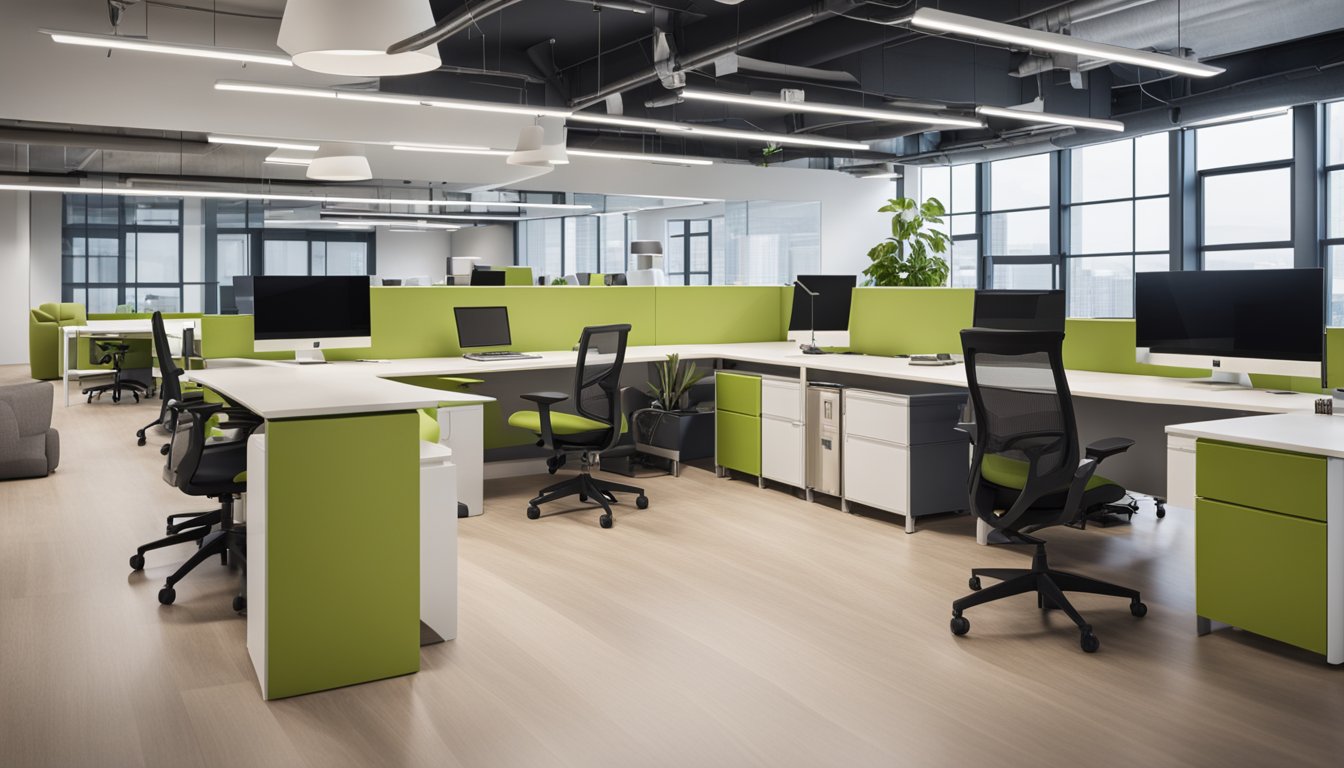Late updated: 18 Aug 2024 13:08
Written by: Amber Collins
Sustainable Office Furniture Choices For UK Businesses: Creating Eco-Friendly Workspaces
Adopting sustainable office furniture is not just an environmentally responsible choice; it also enhances the productivity of UK businesses. By prioritising eco-friendly solutions, we can create workspaces that benefit both the planet and our employees. Choosing sustainable office furniture allows businesses to reduce their environmental impact while showcasing a commitment to sustainability.

In the UK, several options exist for sourcing eco-friendly office furniture that doesn't compromise on style or function. Whether it’s a stylish chair from HÅG Capisco or a foldable desk from Posturite, businesses have a variety of choices to fit any office setup. These options not only contribute to a greener workplace but also create a more appealing and efficient environment for employees.
We are witnessing a growing trend among businesses to adopt sustainable practices, and this includes the very furniture we use daily. From using recycled materials to sustainable manufacturing processes, the options available make it easier for businesses to make informed and responsible choices. By integrating sustainable furniture, companies can enhance their corporate social responsibility and attract eco-conscious clients and employees.
Key Takeaways
- Sustainable office furniture reduces environmental impact and boosts workplace productivity.
- Numerous eco-friendly options are available to suit different UK office setups.
- Integrating sustainable furniture enhances corporate social responsibility.
Understanding Sustainable Office Furniture

When we discuss sustainable office furniture, it's essential to consider the environmental benefits it offers, the impact on health and wellbeing in the workplace, and the specific materials and certifications that ensure true sustainability. These factors help businesses make environmentally responsible choices that positively affect both employees and the planet.
Environmental Benefits
Sustainable office furniture significantly reduces our carbon footprint. By choosing items made from recycled materials like recycled plastics or FSC-certified wood, we minimise waste and support the circular economy. This approach prevents useful materials from ending up in landfill, thus reducing environmental impact.
Furthermore, sustainable furniture often involves responsible sourcing practices, ensuring materials are ethically obtained. Bamboo and recycled wood are excellent examples that promote biodiversity and environmental conservation. By prioritising these options, businesses contribute to a sustainable workspace and foster an environment-conscious culture.
Health and Wellbeing in the Workplace
Another crucial aspect of sustainable office furniture is its positive impact on employee wellbeing. Furniture made from non-toxic materials, free from harmful chemicals like formaldehyde and volatile organic compounds (VOCs), improves indoor air quality. This is vital for maintaining a healthy work environment.
Better air quality leads to fewer health issues, enhancing overall comfort and productivity at work. Sustainable furniture also often features ergonomic designs aimed at fostering employee comfort, thereby contributing to physical health. Such choices demonstrate a commitment to employee health and offer benefits beyond environmental considerations.
Sustainable Materials and Certifications
Understanding the materials and certifications related to sustainable office furniture helps us identify truly eco-friendly options. Wood sourced from Forest Stewardship Council (FSC)-certified forests guarantees minimal impact on forests and promotes responsible forestry practices.
In addition to FSC, certifications like Cradle to Cradle and GREENGUARD ensure products meet strict environmental and health standards. Moreover, using materials such as recycled plastics and eco-friendly materials reinforces a commitment to sustainability.
By focusing on these criteria, businesses can make informed decisions, contributing to a sustainable future while ensuring durability and high-quality furniture options for the workplace.
Implementing Sustainability in Practice

Implementing sustainability involves careful planning and execution. We must focus on procurement, design, functionality, and effective lifecycle management to achieve a truly sustainable office environment.
Procurement Strategies and Brand Image
When procuring sustainable office furniture, our priority should be on sourcing from manufacturers committed to ethical practices. Brands that hold green certifications such as BREEAM, LEED, or SKA reflect a genuine commitment to sustainability. By selecting products with an Environmental Product Declaration (EPD), we can ensure transparency in the environmental impact of materials used.
Investing in sustainable furniture improves our brand image and demonstrates our commitment to environmental responsibility. It is essential to balance this with budget considerations, ensuring that choices are cost-effective while supporting long-term sustainability goals. Ethical sourcing of raw materials like bamboo and reclaimed wood strengthens our organisational ethos.
Design and Functional Considerations
The design of sustainable office furniture should prioritise modularity and longevity. Furniture that can be easily reconfigured supports a productive work environment and adapts to changing needs. Incorporating LED lighting into design not only saves energy but also enhances the aesthetic appeal of the workspace.
Ergonomics remain crucial for ensuring employee well-being. Selecting chairs and desks that support proper posture minimizes health risks such as back pain. Meanwhile, the use of natural resources like water-based finishes reduces harmful carbon emissions. The workplace should be visually appealing, fostering a positive and motivating ambiance.
Lifecycle Management and Disposal
Managing the lifecycle of office furniture involves considering its entire journey from acquisition to disposal. Embracing principles of the circular economy, we repurpose or refurbish furniture to extend its useful life. End-of-life disposal should prioritise environmentally-friendly methods, such as recycling or upcycling.
To ensure minimal impact, partnerships with companies that offer SCS Indoor Advantage™ certification can guarantee indoor air quality, reducing health risks including cancer and respiratory issues. Establishing clear environmental policies ensures adherence to sustainable practices, guiding decisions on refurbishment or replacement. This not only supports cost savings but also reinforces our commitment to sustainability.
Frequently Asked Questions

Our guide addresses specific concerns regarding sustainable office furniture choices for UK businesses, focusing on leading brands, procurement methods, material preferences, recognised companies, non-toxic verifications, and reception desk options.
What are the leading sustainable office furniture brands in the UK?
Some UK-based leaders in sustainable office furniture include Orangebox, Think Furniture, and Elements Contract Furniture. These brands are renowned for their environmentally friendly practices and products, combining innovative design with sustainable materials.
How can UK businesses procure office furniture made from recycled materials?
UK businesses can source office furniture made from recycled materials through specialised suppliers such as Sit-Stand.Com, which offers products like desks and chairs fabricated from recycled content. Additionally, opting for refurbished furniture through companies like Rype Office can be both cost-effective and sustainable.
What types of sustainable materials are preferable for office furniture?
Preferred sustainable materials for office furniture include FSC-certified wood, reclaimed wood, and recycled metals and plastics. Bamboo is also a popular choice due to its fast-growing nature and renewable qualities. Upholstery made from organic cotton, wool, or recycled fabrics adds to the sustainability credentials.
Which furniture companies have been recognised for their sustainability efforts?
Companies such as Vitra and Herman Miller have received recognition for their sustainability efforts, including awards and certifications. Steelcase is another notable firm, known for its commitment to sustainable design and manufacturing processes.
How can businesses determine if an office furniture piece is non-toxic?
Businesses can ensure office furniture is non-toxic by checking for certifications like GREENGUARD or Blue Angel, which indicate low chemical emissions. Additionally, reviewing the manufacturer's materials list and avoiding furniture with harmful chemicals like flame retardants or formaldehyde ensures a healthier workplace.
What options are available for eco-friendly reception desks for UK organisations?
Eco-friendly reception desks can be found through suppliers like Bark Furniture and Home Office Furniture. These companies offer desks made from sustainable materials such as recycled metal leg frames and surfaces crafted from reclaimed wood or bamboo, pairing functionality with green credibility.
